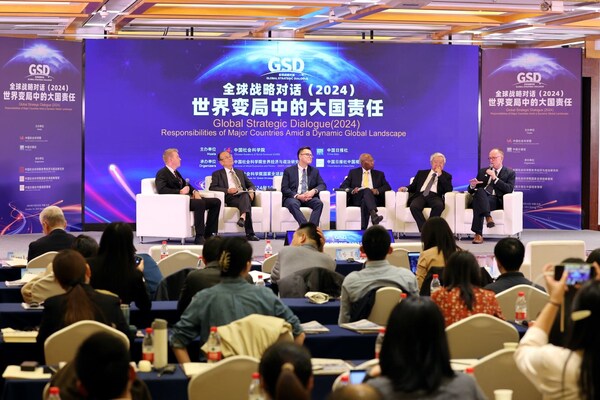Communication and unity are essential for securing future stability, prosperity
BEIJING, Oct. 25, 2024 /PRNewswire/ -- The article has been published by China Daily on Oct. 25:

Speakers share their insights at the forum Global Strategic Dialogue 2024: Responsibilities of Major Countries Amid a Dynamic Global Landscape, jointly hosted by the Chinese Academy of Social Sciences and China Daily in Beijing on Thursday. Photo by Wang Zhuangfei/China Daily
"Our world is at a crossroads. We must decide whether to maintain the status quo and face potential self-destruction or chart a new course toward global unity by making significant changes to save our civilization."
Above are the words of Essam Sharaf, former prime minister of Egypt, who delivered a speech at the Global Strategic Dialogue 2024: Responsibilities of Major Countries Amid a Dynamic Global Landscape, jointly hosted by the Chinese Academy of Social Sciences and China Daily in Beijing on Thursday.
Sharaf stressed that in today's highly interconnected world, "a collapse of a country or a region may lead to a global collapse." Unfortunately, developed nations seldom consider this, he said, nor do they care much about the developing ones.
"It's time to emphasize that the challenges we encounter as a global community require global cooperation without any exclusions," he said.
Sharaf spoke highly of China's initiative to build a community with a shared future for humanity and insisted that global diversity is key to the advancement of the world's civilizations.
The former prime minister talked about the path of Chinese modernization, raising key points such as connectivity, trust, peace, development and prosperity and showcased how these values have helped China turn dreams into reality.
"What applies in China could be transferred to the world," he said.
Gao Xiang, president of the CASS, said developed nations need to take an active role in fostering global relations.
"Major powers should enhance communication and collaboration, respect interests and major concerns, effectively manage control and actively build a new type of international relationship characterized by non-conflict, non-confrontation, mutual respect and win-win cooperation," Gao said. "And the international community should strengthen unity and cooperation, adhere to the principle that all countries — big or small — are equal, practice genuine multilateralism and promote the development of an international order that is more just and reasonable."
Qu Yingpu, publisher and editor-in-chief of China Daily, stressed the need for international cooperation to address problems.
"Faced with the myriad of emerging risks and challenges, how to adapt to situations, promote peace and seek development are common concerns for the international community," he said in his keynote speech. "This requires not only major countries to play a leading role, but also cooperation among all nations."
Qu also called for global media and think tanks to join hands to deepen understanding and cooperation among countries, stand on the right side of history, support the progress of human civilization and promote the construction of a community with a shared future for humanity.
Still, conflicts may arise among world powers, said Fedor Voytolovskiy, director of the Institute of World Economy and International Relations of the Russian Academy of Sciences, in his speech.
He called for an emerging polycentric world order, saying it could serve as a new model of globalization based on the rise of new centers of global value chains, FDI and international trade, and the emergence of China as a global economic and technological power. It could also further strengthen global and regional governance institutions such as BRICS, the Shanghai Cooperation Organization and the G20.
Domenico Lombardi, professor and director of the Policy Observatory at LUISS University in Italy, also stressed the importance of a new major-power relationship, saying that the concept of economic decoupling, particularly between the United States and China, presents a significant risk that could reverberate through all sectors of the global economy.
"Such a shift could lead to inefficiencies and increased costs, impacting global growth negatively that no one can simply afford," he said.
He cited the trade relationships between European Union countries and China as an example, which have strengthened lately despite appearances to the contrary, including disputes over China's exportation of its electric vehicles.
Sharaf said he doesn't believe that China is looking to engage in any conflicts with other nations. He said he was talking with a Chinese friend recently about how China is a peaceful country.
"Don't expect that China will go to war," Sharaf said. "He (the friend) assured that China will provide all assistance for peacekeeping."
Amitav Acharya, distinguished professor of international relations with the School of International Service at American University, said developed nations would do well to remember that their success is due in part to the knowledge they've learned from their lesser-developed counterparts.
"The West should accept that its rise to global dominance would not have been possible without borrowing from the ideas and approaches of other civilizations," he said in his speech. "Both the West and the rest have learned from each other, and this mutual learning among civilizations is a far more persistent feature of world history than the 'clash of civilizations'."
Contact the writers at zhangzhouxiang@chinadaily.com.cn
source: China Daily
《說說心理話》身體唔舒服查唔到原因?周身痠痛疲累?可能係患有心身症!點解原生家庭會長時間影響一個人?點樣脫離循環?► 即睇































